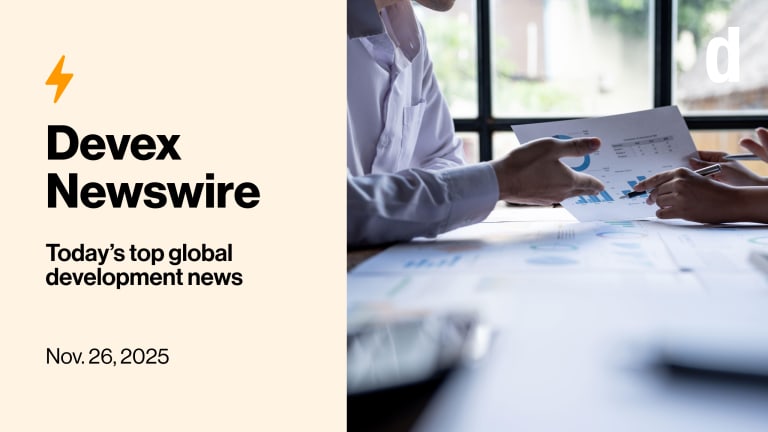
Currently, change seems to be the only constant we can expect from the British government. The appointment of Alok Sharma as the fifth secretary of state for international development in just four years marks yet another new era to which the aid community in the United Kingdom must brace itself and adjust.
So as Sharma takes his seat, rolls up his sleeves, and gets his feet under his desk, here are five pressing priorities that we hope will be at the top of his in-tray:
1. Double down on climate change
Alok Sharma named new secretary of state
Sharma's appointment as U.K. aid chief was a moment of relief for the development community amid speculation that DFID might lose its secretary of state.
The new secretary of state should step up momentum on his predecessor’s radical pledge to double aid spending on climate and environment to more than £2 billion ($2.5 billion) over the next five years.
The focus must remain on supporting countries with the most vulnerable populations and Theresa May’s recent G-20 summit pledge to align official development assistance with green objectives is welcome — in addition to DFID’s latest unprecedented aid package to help tackle climate change across Africa.
Climate disasters do not respect state borders or man-made frontiers and will eventually affect us all. At Crown Agents we have supported governments in Nigeria, Zimbabwe, and Kenya to roll out solar and renewable energy as part of strengthening health systems and improve access to clean water — exactly the sort of development-climate “win-win” that the new minister will need to champion.
2. Reboost the SDGs
Heads of state and ministers are set to attend the UNGA SDG Summit in September where countries will debate what progress has been made on achieving the Sustainable Development Goals to date. As we enter the “decade of delivery” in the run-up to 2030, the new secretary of state should focus on where the least progress has been made, while heeding some of the tough lessons learned as part of the Voluntary National Review process member states recently reported on at the United Nations.
Back in 2015, the U.K. played a leading role in shaping the SDG agenda and securing global commitment to the 17 global goals which replaced the Millennium Development Goals. The new secretary of state must embrace this challenge with fresh commitment, including the fact that far too few people are aware of what they stand for and their significance.
A reintroduction of the “Development Education Programme,” abolished in 2011, would be a good start to ensure that everyone from schools, the private sector, and U.K-focused civil society groups understood the centrality of the SDGs to creating a safer, healthier, and more prosperous world for us all.
3. Prioritize the Africa Investment Summit
Theresa May in Africa: The key development issues
May was the first British prime minister to visit the African continent in five years. Devex rounds up the key development issues, and what they could really mean for the U.K.'s partnership with Africa.
Boosting badly needed trade and investment in Africa is not only key to boosting economic growth across the continent, but is also a key driver of poverty reduction; fighting disease and hunger; reducing conflict and refugee crises; and promoting political stability.
The “Africa Beyond Aid” agenda set out by Ghanaian President Akufo-Addo in a 2016 speech is an aspiration widely shared and echoed throughout the continent. Reiterating May’s pledge in 2018 for the U.K. to eclipse the U.S. as the single largest G-7 investor in Africa, U.K. Trade Commissioner for Africa Emma Wade-Smith has outlined her commitment to seize the opportunity to invest billions in Africa’s growth after Britain leaves the European Union.
The U.K.-Africa Investment Summit in 2020 is a major opportunity for critical dialogue to take place between African heads of state and U.K. experts and investors to forge this mutually beneficial agenda. DFID’s role will be vital in ensuring that trade and economic growth across the continent happens sustainably and benefits the widest number of people, particularly those who are the most vulnerable to being left behind.
4. Protect aid dollars post-Brexit
What's at stake for aid in the Brexit deal?
From funding to influence, Devex looks at the big issues for aid as politicians scramble to seal a Brexit agreement.
Three months away from what could be Britain’s definitive departure from the EU, the question of how Brexit will affect EU development funds remains unanswered. The U.K. is one of only a few countries that consistently meets its commitment to spend 0.7% of gross national income on development overseas.
Around £1.5 billion of this money is currently channeled into the European Development Fund and other EU development budgets, making Britain the third-largest donor.
In the scenario where the U.K. leaves Europe with no deal, the secretary of state must ensure that DFID fulfills its assurances to underwrite any contracts lost after EU funding is withdrawn. In the long-term, the secretary of state should lead an innovative strategy to roll out new funding instruments and mechanisms that will guarantee the future of U.K. aid when the transition period comes to an end.
The secretary of state should also commit to guaranteeing that any new rules for funding will be firmly anchored in humanitarian principles.
5. Make a stand in the Spending Review
The U.K. government’s Spending Review will take place in the fall and hanging in the balance is the U.K.’s five-year track record of consistently meeting its 0.7% commitment on ODA spending.
The department currently controls 72% of the aid budget, a portion in steady decline from 86% in 2014. Late last year, DFID Permanent Secretary Matthew Rycroft warned that if DFID’s portion falls any further, the 0.7% target cannot be met and called for DFID’s share of the budget to rise to a minimum of 75%.
The position of the new secretary of state will be one to watch considering the very different perspectives his predecessors have had on this matter. Many feel that now is the time to call for a 3% umbrella to include 0.7% on ODA; 2% on defense and 0.3% on diplomacy to ensure that we properly resource the breadth of the international effort.
It’s time to lead.
With political uncertainly at home and the post-1945 rules-based international order increasingly challenged, the U.K. needs to be prepared and properly equipped to play a leading role on the global stage.
A confident and innovative DFID supported by a world class U.K. development sector has a key role to play in navigating existential challenges from climate change to migration and pandemics. It is only through a strong and well-resourced aid sector, aligned across Whitehall and working with global business that ambitions will be realized for a safer and fairer world — which is inextricably linked to the U.K.’s own national interests.








